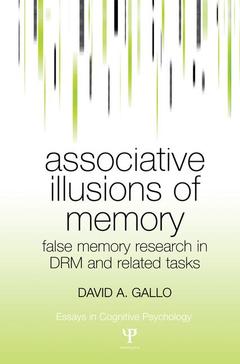Description
Associative Illusions of Memory
False Memory Research in DRM and Related Tasks
Essays in Cognitive Psychology Series
Language: English
Subject for Associative Illusions of Memory:
Keywords
related; lures; false; recall; recognition; unrelated; drm; task; illusory; recollection; Related Lure; Unrelated Lures; False Recall; False Recognition; False Memory; Fuzzy Trace Theory; Nonstudied List; Illusory Recollection; MTL Amnesic; Distinctiveness Heuristic; Final Recognition Test; False Memory Research; Part-list Cues; Early Visual Regions; True Recall; False Remembering; False Memory Effect; Prior Recall; False Recognition Effects; False Memory Tasks; Frontal Patients; Backward Associative Strength; True Recognition; Semantic Dementia
Publication date: 06-2014
Support: Print on demand
Publication date: 10-2006
192 p. · 15.2x22.9 cm · Hardback
Description
/li>Contents
/li>Biography
/li>Comment
/li>
The last decade has seen a flurry of experimental research into the neurocognitive underpinnings of illusory memories. Using simple materials and tests (e.g., recalling words or pictures), methods such as the famed Deese-Roediger-McDermott (DRM) task have attracted considerable attention. These tasks elicit false memories of nonstudied events that are vivid, long lasting, and difficult to consciously avoid. Additional research shows that these memory illusions are fundamentally related to more complex memory distortions. As a result, this rapidly expanding literature has generated a great deal of excitement - and even some controversy - in contemporary psychology.
Associative Illusions of Memory provides an ambitious overview of this research area. Starting with the historical roots and major theoretical trends, this book exhaustively reviews the most recent studies by cognitive psychologists, neuropsychologists, and cognitive neuroscientists. The strengths and limits of various experimental techniques are outlined, and the large body of existing data is meaningfully distilled into a few core theoretical concepts.
This book highlights the malleability of memory, as well as the strategies and situations that can help us avoid false memories. Throughout the review, it is argued that these basic memory illusions contribute to a deeper understanding of how human memory works.
Part I. Background. Associations and errors through history. Converging association tasks. Part II. Basic theories and data. Processes that cause false memory.Illusory recollection. Processes that reduce false memory. Additional study and test manipulations. Part III. Applications and data. Individual differences and generalizability. Development and aging. Neuropsychology and drugs. Neuroimaging and localization. Summary and conclusions.
David Gallo is an Assistant Professort of Psychology at Chicago University. He previously was an NIH postdoctoral research fellow at Harvard University and he received his PhD in Experimental Psychology at Washington University in St. Louis, where he was awarded a graduate research scholarship from the American Psychological Foundation
These books may interest you

Theories Of Memory II 61.25 €



